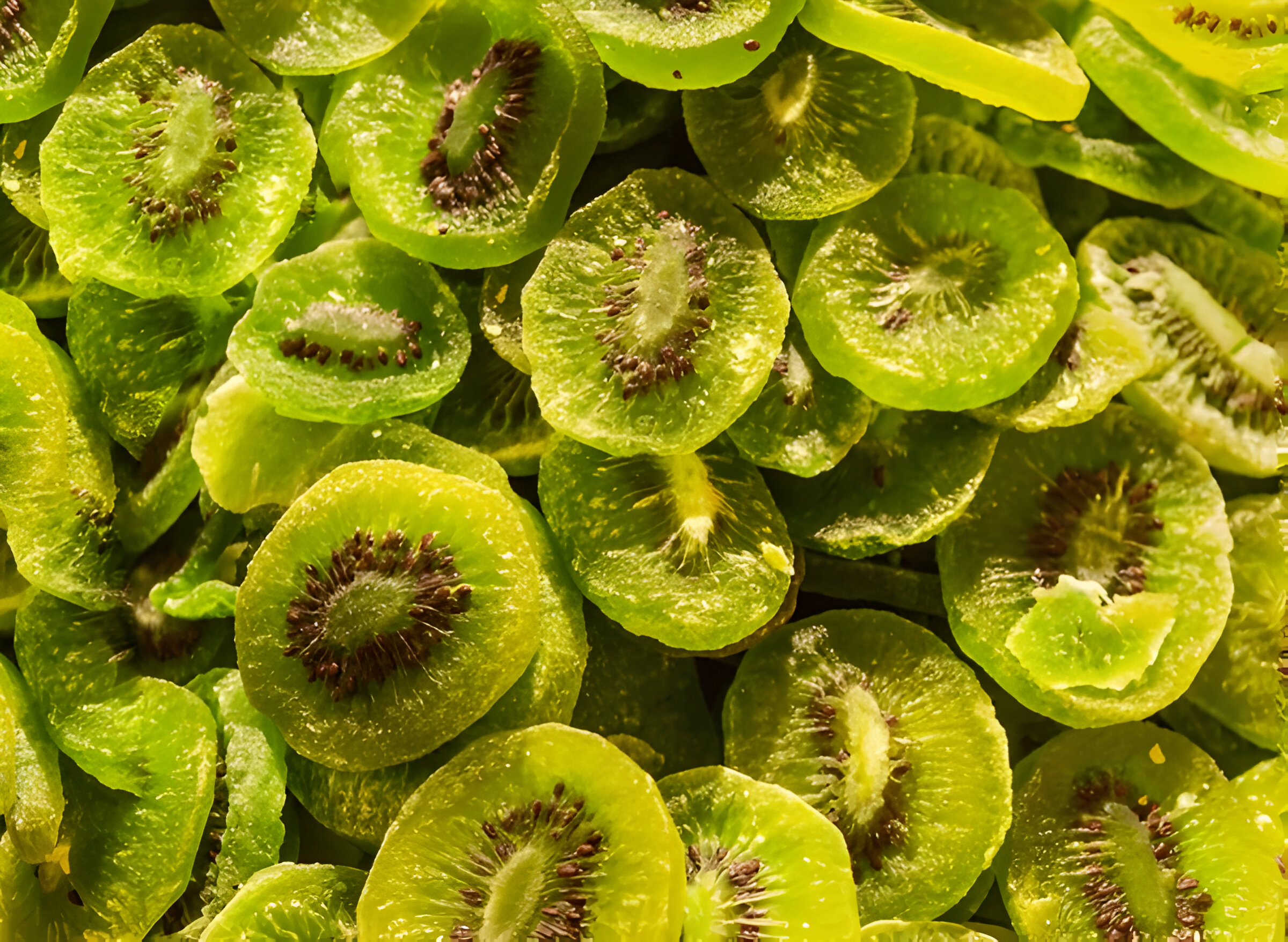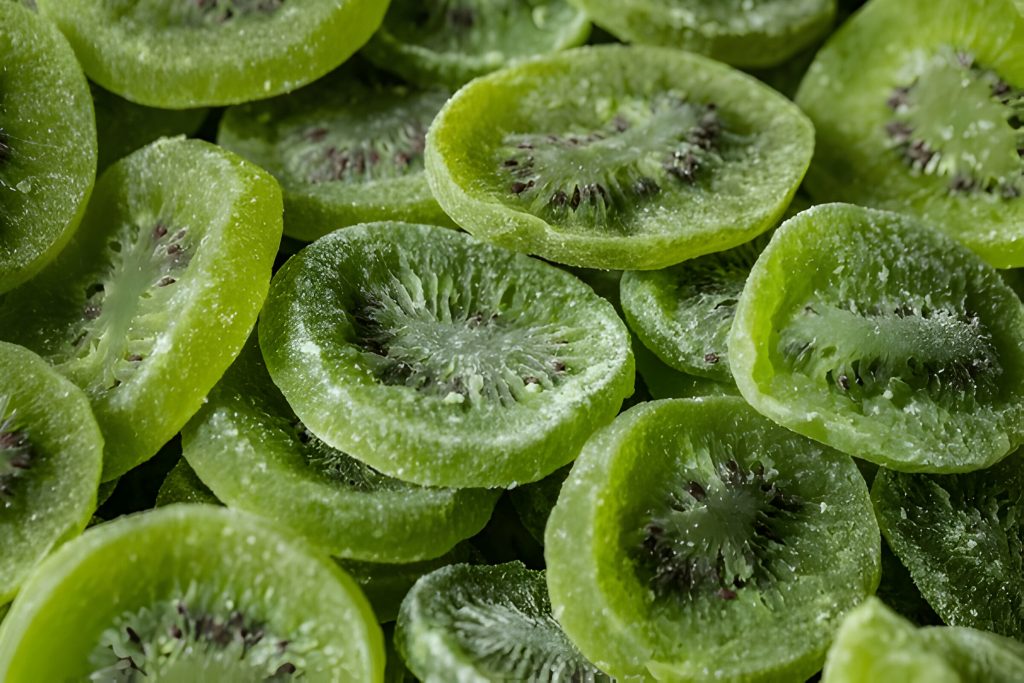Introduction to Dried Kiwi
Health-Benefits-of-Dried-Kiwi
Did you know that a small, green fruit could pack a powerful nutritional punch? Dried kiwi is becoming increasingly popular among health-conscious individuals, and for good reason. With its unique combination of sweet and tangy flavors, dried kiwi isn’t just a delicious treat—it’s also a powerhouse of nutrients that can benefit your overall health.
Originating from China, the kiwi fruit has a fascinating history. It wasn’t until the 20th century that it made its way to New Zealand, where it was named after the country’s native bird, the kiwi. Today, dried kiwi is celebrated worldwide for its taste and health benefits, making it a staple in the diets of many nutrition seekers and food bloggers.
In this blog post, we’ll explore the many advantages of adding dried kiwi to your diet. From its impressive nutritional profile to its versatile culinary uses, you’ll soon see why this little fruit is worth incorporating into your daily routine.
Nutritional Value of Dried Kiwi
When it comes to nutrition, dried kiwi doesn’t disappoint. This fruit is loaded with essential vitamins and minerals that are crucial for maintaining good health.
Firstly, dried kiwi is an excellent source of vitamin C, which plays a vital role in boosting the immune system and promoting healthy skin. Just one serving of dried kiwi can provide you with a significant portion of your daily vitamin C needs.
In addition to vitamin C, dried kiwi is rich in dietary fiber. Fiber is essential for digestive health, helping to regulate bowel movements and prevent constipation. Consuming fiber-rich foods like dried kiwi can also help you feel fuller for longer, making it easier to maintain a healthy weight.
Furthermore, dried kiwi contains important minerals such as potassium and magnesium. Potassium is crucial for maintaining healthy blood pressure levels, while magnesium supports muscle function and energy production. Including dried kiwi in your diet can help ensure you’re getting these vital nutrients.
Health Benefits of Dried Kiwi
The health benefits of dried kiwi extend far beyond its impressive nutritional profile. Here are some of the top reasons to consider adding this fruit to your diet:
One of the most notable benefits of dried kiwi is its ability to improve digestion. Thanks to its high fiber content, dried kiwi can help keep your digestive system functioning smoothly. Fiber aids in the digestion process by adding bulk to stool and promoting regular bowel movements.
Another benefit of dried kiwi is its potential to support heart health. The potassium found in dried kiwi helps regulate blood pressure, reducing the risk of hypertension and related cardiovascular issues. Additionally, the antioxidants present in dried kiwi can help combat oxidative stress, which is linked to heart disease.
Dried kiwi is also known for its immune-boosting properties. The vitamin C content in dried kiwi can help strengthen the immune system, making it easier for your body to fend off illnesses and infections. Incorporating dried kiwi into your diet can be particularly beneficial during cold and flu season.
Improved Digestion
One of the standout benefits of dried kiwi is its impact on digestive health. The high fiber content helps regulate bowel movements, preventing constipation and promoting a healthy gut. Additionally, kiwi contains natural enzymes that aid in breaking down proteins, making digestion smoother and more efficient.
Immune System Support
Thanks to its high Vitamin C content, dried kiwi can be a powerful ally in boosting your immune system. Vitamin C helps in the production of white blood cells, which are crucial for fighting off infections. Regular consumption of dried kiwi can thus act as a preventive measure against common illnesses like colds and flu.
Heart Health
The minerals found in dried kiwi, particularly potassium and magnesium, are essential for heart health. Potassium helps control blood pressure by balancing out the negative effects of salt, while magnesium is vital for maintaining a steady heartbeat. Together, these nutrients contribute to a healthier cardiovascular system.
Culinary Uses for Dried Kiwi
One of the best things about dried kiwi is its versatility in the kitchen. There are countless ways to incorporate this nutritious fruit into your meals and snacks.
For a quick and easy snack, enjoy dried kiwi on its own. Its natural sweetness makes it a satisfying treat that you can enjoy anytime. You can also add dried kiwi to your favorite trail mix for an extra burst of flavor and nutrition.
If you’re looking to add a unique twist to your salads, try tossing in some dried kiwi slices. The tangy flavor pairs well with leafy greens and adds a delightful contrast to savory ingredients. You can also use dried kiwi as a topping for yogurt or oatmeal for a nutritious breakfast or snack.
Lastly, dried kiwi can be a delightful addition to baked goods. Chop up some dried kiwi and mix it into muffin or cookie batter for a fruity twist. The possibilities are endless when it comes to using dried kiwi in your culinary creations.
Salads
Dried kiwi adds a delightful tang and chewiness to salads. Combine it with leafy greens, nuts, and a light vinaigrette for a refreshing and nutritious meal. The sweet and sour notes of the kiwi can elevate a simple salad to a gourmet experience.
Trail Mixes
Creating your own trail mix is a fantastic way to incorporate dried kiwi into your diet. Mix it with various nuts, seeds, and other dried fruits for a convenient, on-the-go snack. This combination not only offers a burst of energy but also provides a balanced mix of carbs, fats, and proteins.
Standalone Snack
Sometimes, simplicity is key. Dried kiwi makes for an excellent standalone snack that you can enjoy anytime, anywhere. Its natural sweetness and chewy texture make it a satisfying alternative to sugary treats.
Risks and Precautions
While dried kiwi offers numerous health benefits, it’s important to be aware of potential risks and precautions associated with its consumption.
One consideration is the presence of added sugars in some commercial dried kiwi products. To enhance the flavor and shelf life, manufacturers sometimes add sugar to dried kiwi. Consuming too much added sugar can lead to various health issues, including weight gain and increased risk of chronic diseases. When purchasing dried kiwi, look for options with no added sugar or make your own at home.
Allergies are another potential concern. Although kiwi allergies are relatively rare, they can cause severe reactions in some individuals. If you have a known allergy to kiwi or other fruits, it’s best to consult with your healthcare provider before adding dried kiwi to your diet.
Additionally, because dried kiwi is concentrated, it’s calorie-dense compared to fresh kiwi. While it’s a healthy snack, it’s important to consume it in moderation, especially if you’re watching your calorie intake.
Allergies
While dried kiwi is generally safe for most people, it’s essential to be aware of potential allergic reactions. Some individuals may experience oral allergy syndrome, which can cause itching or swelling in the mouth and throat. If you have a known fruit allergy, consult your healthcare provider before adding dried kiwi to your diet.
Added Sugars
Not all dried kiwis are created equal. Some brands add extra sugars during the drying process, which can negate some of the health benefits. Always check the ingredient list and opt for brands that offer unsweetened or naturally dried kiwi to avoid unnecessary sugar intake.
Buying Guide for Dried Kiwi
Selecting High-Quality Dried Kiwi
When shopping for dried kiwi, look for products that are free from added sugars, artificial colors, and preservatives. The color should be a natural green, indicating minimal processing. Organic options are often the best choice as they are less likely to contain harmful pesticides.
Storage Tips
Proper storage is crucial for maintaining the freshness and nutritional value of dried kiwi. Keep it in an airtight container, preferably in a cool, dark place. If you buy in bulk, consider dividing the stock into smaller portions and storing them in the refrigerator to extend shelf life.
Buying Guide for Dried Kiwi
To get the most out of your dried kiwi experience, it’s essential to choose high-quality products and store them properly.
When shopping for dried kiwi, opt for brands that use minimal processing and no added sugars. Organic options are often a good choice, as they are free from pesticides and other harmful chemicals. Check the ingredient list to ensure you’re getting a pure product without unnecessary additives.
Proper storage is key to maintaining the freshness and flavor of dried kiwi. Keep your dried kiwi in an airtight container in a cool, dry place. Avoid exposure to direct sunlight or humidity, as this can cause the fruit to spoil more quickly. When stored correctly, dried kiwi can last for several months.
Conclusion
Dried kiwi is a delicious and nutritious snack that offers a range of health benefits. From its impressive nutritional profile to its versatile culinary uses, there are plenty of reasons to incorporate dried kiwi into your diet.
Whether you’re looking to improve your digestion, support your heart health, or simply enjoy a tasty treat, dried kiwi has something to offer. Remember to choose high-quality products and consume them in moderation to make the most of this nutritious fruit.
Share your favorite dried kiwi recipes or health tips in the comments below. Let’s build a community of health enthusiasts who love exploring new and nutritious foods!
By integrating relevant keywords and linking to reputable sources, this blog post can help enhance search engine visibility and drive traffic. Enjoy the benefits of dried kiwi and elevate your health today!







